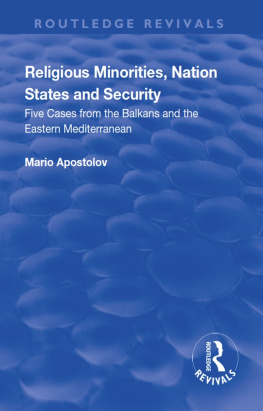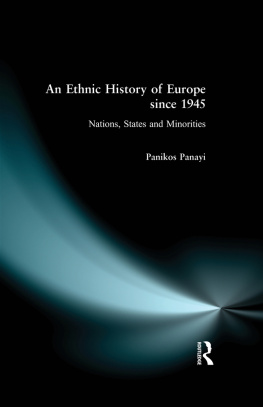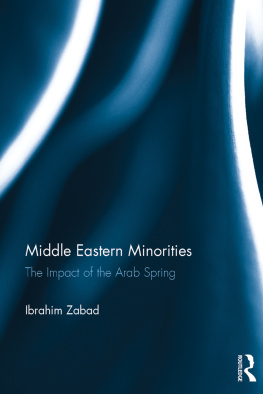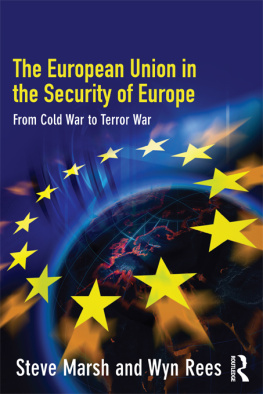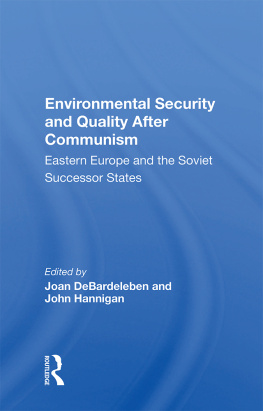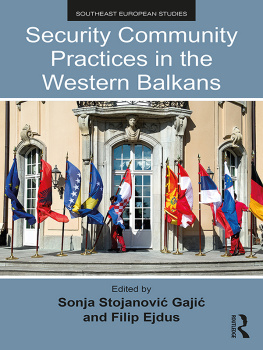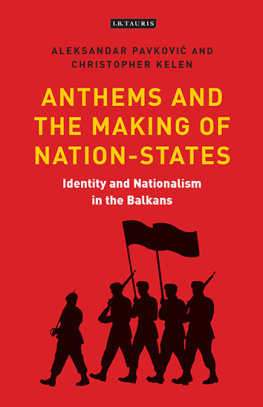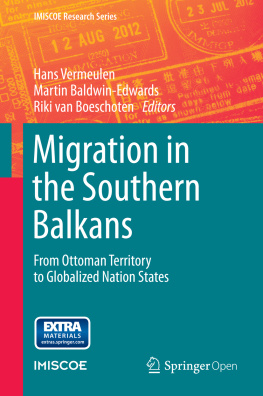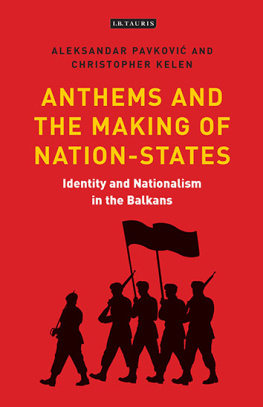RELIGIOUS MINORITIES, NATION STATES AND SECURITY
To my parents
Korteza and Apostol Apostolovi
Religious Minorities, Nation States and Security
Five cases from the Balkans and the Eastern
Mediterranean
MARIO APOSTOLOV
Graduate Institute of International Studies
Geneva, Switzerland
First published 2001 by Ashgate Publishing
Reissued 2018 by Routledge
2 Park Square, Milton Park, Abingdon, Oxon OX14 4RN
711 Third Avenue, New York, NY 10017, USA
Routledge is an imprint of the Taylor & Francis Group, an informa business
Copyright Mario Apostolov 2001
All rights reserved. No part of this book may be reprinted or reproduced or utilised in any form or by any electronic, mechanical, or other means, now known or hereafter invented, including photocopying and recording, or in any information storage or retrieval system, without permission in writing from the publishers.
Notice:
Product or corporate names may be trademarks or registered trademarks, and are used only for identification and explanation without intent to infringe.
Publishers Note
The publisher has gone to great lengths to ensure the quality of this reprint but points out that some imperfections in the original copies may be apparent.
Disclaimer
The publisher has made every effort to trace copyright holders and welcomes correspondence from those they have been unable to contact.
A Library of Congress record exists under LC control number: 2001022160
ISBN 13: 978-1-138-70535-7 (hbk)
ISBN 13: 978-1-315-20222-8 (ebk)
Contents
In the minds of many people what happens in the occupied Palestinian territories, in Lebanon, or in Bosnia is a return to religious wars, to an eye for eye behaviour, and to primal, religious conflicts surfacing once again, and defying the idea of universal secularisation of politics. Confrontation among confessional communities undermined the foundations of the state in various parts of the world, from Northern Ireland and Bosnia to Lebanon, India and Indonesia. Yet beneath the surface, the real movement is an opposition of one nation state-building programme against another. The reason for the problems involving religious minorities is the division of the world into nation states.
The Westphalian type of state may be the optimal available unit of social organisation, yet no reasonable person can claim that it is perfect. One of the problems is, for example, the lack of guarantees for the individual and collective security of members of certain confessional communities. The present book concentrates on the difficult relations between nation states and religious minorities in several countries of the Balkans and the Middle East, a broad area where communal conflicts repeatedly challenge the existing state system, often contributing to the rigidity and exclusiveness of nationalism. The countries of the post-Ottoman space have gone in their contemporary history through painful processes of nation-state building, which destroy millennia-old communal structures and identities.
This study materialised in a period when the walls of an ideologically divided world were falling apart. It reflects my personal experience with great expectations, disillusionment and search for a more solid ground for enhancing a global community which lives on a small planet. It is for this reason that some of the conclusions may sound idealist, but it is an expression of the hope that artificial barriers will continue to fall, and new ones will not be built.
My thanks go first to Andr Liebich, Head of the History and Politics Department of the Graduate Institute of International Studies in Geneva, a tutor and a friend, whose advice and assistance were crucial for the accomplishment not only of this but also of a number of other projects. I am grateful to Keith Krause for his very useful comments, which helped me improve significantly my work, and to Stefan Troebst and Curt Gasteyger for their valuable contributions. I am indebted to John Micgiel, Glen McDonald, Helen Wood, Marina Silbermann, Robin Ramcharan, George Daniel, Kemlin Furley, Randall Harbour and Alice Landau for their comments on earlier versions of this text. I want to express my special gratitude to the Swiss National Science Foundation and to the Socit Acadmique de Genve whose support made this publication possible. Their grants allowed me to work in the libraries of Columbia University in New York, the UN, IUHEI and the University of Geneva, research which I completed with field missions to all the countries of the case studies in this text. I would also like to thank the Gallatin Fellowship Program and the Katzarov Foundation, who helped me in the initial stages of my work on this subject. Last but not least I want to thank my wife, Rossi, for the years of support and patience.
The objective of this book is to help understand why violent conflicts involving religious minorities persist in the age of nation states. It focuses on an area which is characterised by recurrent conflict among confessional groups and by uneven evolution of nation states: the Eastern Mediterranean and the Balkans, the historical zone of contact between Christianity and Islam. The contemporary history of such plural societies as Lebanon and Bosnia is marked by acute conflicts that have put into question the existence of some states. Communal violence continues to be a problem in such states with large religious minorities as Egypt.
The rise of the nation state, the growing interaction among people of various identities, the difficulties that some societies meet in modernisation, and the problematic results of trans-border interventions raise new challenges to the stability of the international political order. This book concentrates on conflicts involving religious minorities in five cases in the Balkans and the Middle East: the Copts, the Palestinian Christians, the Pomaks and the plural societies in Lebanon and Bosnia and Herzegovina (often referred to as Bosnia for brevity in this text). There exist dozens of religious minorities in the area, such as the Christian Albanians, the Uniate Romanians, the Christian, Alawite or Shia Arabs and Turks, the Jews, and the Gypsies. Yet the five communities were selected for their representative size and political role. The major topics treated here are: the increasing marginalisation of Christians, who once embraced participatory nationalism in Egypt and in the Palestinian movement; the collapse of the plural regime in Lebanon, due to the inability to adjust communal aspirations to the idea of a Lebanese nation state; and the tension that accompanies the continuous process of nation building in the Balkans, as witnessed by the Bosnian crisis and the fate of the Pomaks in Bulgaria, Greece, Macedonia, Albania and Turkey. All crimes in the Bosnian war: mass murder, rape, and destruction, were committed in the name of establishing nation states of Serbs, Muslims, and Croats in Bosnia and Herzegovina.
For the purposes of this study, religious minorities are defined as minorities which share the same language with the majority of the people in a given state, but differ in terms of religion. Some writers include within the concept both purely religious minorities and national minorities for which religion is a defining feature (Gilbert, 1997), but I have adopted a narrower definition for clarity. Peoples political identity is split among many levels, two of which focus on the nation state and on religion. The anthropologist Clifford Geertz (1993, p. 258) claims that religion is, together with language, race, tradition and regionalism, among those foci of identity around which political loyalties converge, and which serve as the basis for the construction of large, independent, and well-ordered polities. The term used in legal texts is religious minorities, yet this may mean a distinction between an atheist state or majority and a group of religious people. The term confessional implies a body of people pertaining to a particular faith or denomination, and is more apt to the situation in the Balkans and the Eastern Mediterranean. For this reason it is often used in this text instead of religious minorities.


